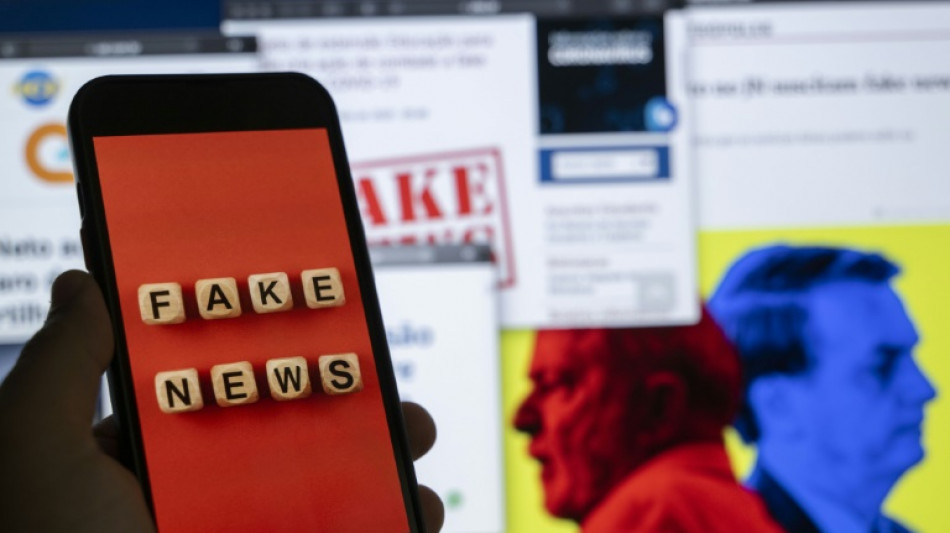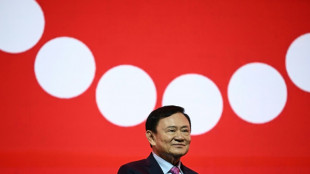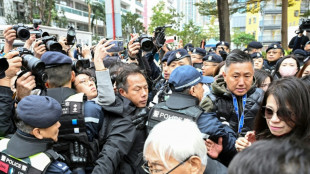
-
 Von Allmen at the double as Nef seals Olympic team combined gold
Von Allmen at the double as Nef seals Olympic team combined gold
-
Newlyweds, but rivals, as Olympic duo pursue skeleton dreams

-
 Carrick sees 'a lot more to do' to earn Man Utd job
Carrick sees 'a lot more to do' to earn Man Utd job
-
Olympic star Chloe Kim calls for 'compassion' after Trump attack on US teammate

-
 'All the pressure' on Pakistan as USA out to inflict another T20 shock
'All the pressure' on Pakistan as USA out to inflict another T20 shock
-
Starmer vows to remain as UK PM amid Epstein fallout

-
 Howe would 'step aside' if right for Newcastle
Howe would 'step aside' if right for Newcastle
-
Sakamoto wants 'no regrets' as gold beckons in Olympic finale

-
 What next for Vonn after painful end of Olympic dream?
What next for Vonn after painful end of Olympic dream?
-
Brain training reduces dementia risk by 25%, study finds

-
 Gremaud ends Gu's hopes of Olympic treble in freeski slopestyle
Gremaud ends Gu's hopes of Olympic treble in freeski slopestyle
-
Shiffrin and Johnson paired in Winter Olympics team combined

-
 UK's Starmer scrambles to limit Epstein fallout as aides quit
UK's Starmer scrambles to limit Epstein fallout as aides quit
-
US skater Malinin 'full of confidence' after first Olympic gold

-
 Sydney police pepper spray protesters during rallies against Israeli president's visit
Sydney police pepper spray protesters during rallies against Israeli president's visit
-
Israel says killed four militants exiting Gaza tunnel

-
 Franzoni sets pace in Olympic team combined
Franzoni sets pace in Olympic team combined
-
Captain's injury agony mars 'emotional' Italy debut at T20 World Cup

-
 Family matters: Thaksin's party down, maybe not out
Family matters: Thaksin's party down, maybe not out
-
African players in Europe: Ouattara fires another winner for Bees

-
 Pressure grows on UK's Starmer over Epstein fallout
Pressure grows on UK's Starmer over Epstein fallout
-
Music world mourns Ghana's Ebo Taylor, founding father of highlife

-
 HK mogul's ex-workers 'broke down in tears' as they watched sentencing
HK mogul's ex-workers 'broke down in tears' as they watched sentencing
-
JD Vance set for Armenia, Azerbaijan trip

-
 Sydney police deploy pepper spray as Israeli president's visit sparks protests
Sydney police deploy pepper spray as Israeli president's visit sparks protests
-
EU warns Meta it must open up WhatsApp to rival AI chatbots

-
 Scotland spoil Italy's T20 World Cup debut with big win
Scotland spoil Italy's T20 World Cup debut with big win
-
Israeli president says 'we will overcome evil' at Bondi Beach

-
 Munsey leads Scotland to 207-4 against Italy at T20 World Cup
Munsey leads Scotland to 207-4 against Italy at T20 World Cup
-
Japan restarts world's biggest nuclear plant again

-
 Bangladesh poll rivals rally on final day of campaign
Bangladesh poll rivals rally on final day of campaign
-
Third impeachment case filed against Philippine VP Duterte

-
 Wallaby winger Nawaqanitawase heads to Japan
Wallaby winger Nawaqanitawase heads to Japan
-
Thailand's Anutin rides wave of nationalism to election victory

-
 Venezuela's Machado says ally kidnapped by armed men after his release
Venezuela's Machado says ally kidnapped by armed men after his release
-
Maye longs for do-over as record Super Bowl bid ends in misery

-
 Seahawks' Walker rushes to Super Bowl MVP honors
Seahawks' Walker rushes to Super Bowl MVP honors
-
Darnold basks in 'special journey' to Super Bowl glory

-
 Japan's Takaichi may struggle to soothe voters and markets
Japan's Takaichi may struggle to soothe voters and markets
-
Seahawks soar to Super Bowl win over Patriots

-
 'Want to go home': Indonesian crew abandoned off Africa demand wages
'Want to go home': Indonesian crew abandoned off Africa demand wages
-
Asian stocks track Wall St rally as Tokyo hits record on Takaichi win

-
 Bad Bunny celebrates Puerto Rico in joyous Super Bowl halftime show
Bad Bunny celebrates Puerto Rico in joyous Super Bowl halftime show
-
Three prominent opposition figures released in Venezuela

-
 Israeli president says 'we shall overcome this evil' at Bondi Beach
Israeli president says 'we shall overcome this evil' at Bondi Beach
-
'Flood' of disinformation ahead of Bangladesh election

-
 Arguments to begin in key US social media addiction trial
Arguments to begin in key US social media addiction trial
-
Lema AI Raises $24M to Replace 'Check-the-Box' Compliance With the First Agentic AI Built to Secure the Enterprise Supply Chain

-
 Clean Vision Secures R&D Permit for West Virginia Facility
Clean Vision Secures R&D Permit for West Virginia Facility
-
Kypspr Launches Design Partner Program to Automate Healthcare Data Integrity; Announces Lifetime Access for First Two Founding Partners

| BCC | -0.28% | 90.8 | $ | |
| SCS | 0.12% | 16.14 | $ | |
| NGG | -0.93% | 87.23 | $ | |
| GSK | -1.14% | 59.56 | $ | |
| AZN | -1.29% | 190.64 | $ | |
| RIO | 1.77% | 95.09 | $ | |
| CMSC | -0.17% | 23.51 | $ | |
| RBGPF | 0.12% | 82.5 | $ | |
| JRI | 0.31% | 12.99 | $ | |
| RYCEF | 1.54% | 16.88 | $ | |
| CMSD | 0.06% | 23.965 | $ | |
| BTI | -1.9% | 61.61 | $ | |
| VOD | 0.89% | 15.245 | $ | |
| RELX | 1.24% | 29.74 | $ | |
| BCE | 0.44% | 25.205 | $ | |
| BP | 0.13% | 39.05 | $ |

Lies, damn lies and social media: fake news stalks Brazil vote
In a divisive election campaign blighted by fears of unrest if far-right President Jair Bolsonaro refuses to accept defeat, Brazil is waging an uphill battle against disinformation wielded as a political weapon.
Analysts say Bolsonaro's 2018 electoral victory was in no small part due to an effective fake news smear campaign against his opponents.
Four years later, his backers have sought to replicate that feat, turning their attention to leftist ex-president and opinion poll frontrunner Luiz Inacio Lula da Silva.
"Disinformation has run wild" on newer platforms such as Telegram and TikTok, which allow for the rapid dissemination of easily manipulated video content, says Ana Regina Rego, coordinator of the National Network to Combat Disinformation.
Social media videos and other posts have sought to portray Lula, among other things, as an alcoholic who will shut down churches if elected in October.
Bolsonaro also has been targeted by fake news posts that have questioned, for example, whether he was really stabbed on the campaign trail in 2018.
And despite nonstop work to debunk these and other false claims, such posts find fertile ground in a country where a 2018 study found that almost half of Brazilian voters relied on WhatsApp to read news about politics and elections.
The figure was even higher among Bolsonaro voters.
In 2022, spreaders of disinformation have even more avenues including Telegram, the fast-growing messaging system that Bolsonaro has publicly embraced after having posts blocked on Facebook, Twitter and YouTube.
Despite stricter rules adopted and better policing introduced against fake news, experts say new technology is complicating the task.
- Facts, lies, sensationalism -
The reach of fake news is impressive.
Three TikTok videos alleging to show Lula getting drunk on a transparent liquid -- which is actually water -- were seen 6.6 million times, while another five on the same platform that try to cast doubt on Bolsonaro's stabbing had 3.3 million views.
Content that combines "facts, lies and decontextualizations with sensationalism has a 70 percent greater chance to go viral than something informative," Rego noted.
TikTok told AFP its policy is to withdraw content that violates its "community norms" and may affect the electoral process, and to avoid highlighting "potentially misleading information that cannot be verified."
At the outset of the 2022 presidential campaign, Supreme Electoral Court president Alexandre de Moraes vowed the justice system would be "resolute" in the fight against fake news.
And there have been some successes.
Moraes has since ordered social networks to remove several Bolsonaro posts on grounds of disinformation, along with many others from his supporters.
The court oversaw the creation of a group with companies such as Facebook, Instagram, WhatsApp, Google and TikTok to screen out fake news and report offenders.
Campaigns have been rolled out to boost digital literacy among social media users.
WhatsApp agreed to delay until after the election the launch in Brazil of a new "Communities" feature that would allow the creation of groups of groups, with administrators able to send messages to all -- thus vastly increasing the potential for viral information spread.
Telegram bowed to pressure to take down disinformation content under threat of being blocked for not collaborating with the authorities.
"Without the collaboration of the platforms, it is very difficult" to pursue the spreaders of disinformation, said sociologist Marco Aurelio Ruediger of the Getulio Vargas Foundation, a Rio think tank.
"It takes a long time to adopt punitive measures, and by then the damage is already done, because the information has already circulated," he said.
- 'Even worse' -
It is not only on social media, however, where lies are spread.
Bolsonaro himself has repeatedly criticized Brazil's electronic voting system, which he alleges -- without evidence -- is riddled with fraud.
The president is under investigation for the claims.
Bolsonaro, who is fond of saying "only God" can remove him from office, has warned Brazil faces "an even worse problem than the United States."
This has led to fears that his supporters might not accept the results, and that Brazil could see a burst of violence akin to the attack on the US Capitol in January 2021 in the wake of Donald Trump's loss to Joe Biden.
Trump's backers were riled up in part on social media, where Bolsonaro has tens of millions of followers.
"I fear that the results will not be accepted and that violence will be encouraged; we could experience a situation similar to that of the United States," said Ruediger.
L.Mason--AMWN

